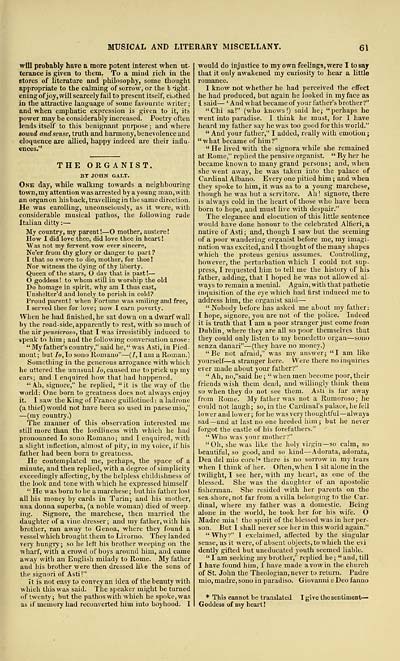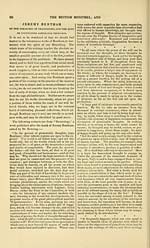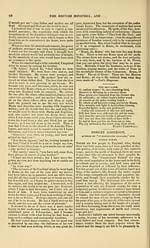Glen Collection of printed music > Printed music > British minstrel, and musical and literary miscellany
(69) Page 61
Download files
Complete book:
Individual page:
Thumbnail gallery: Grid view | List view

MUSICAL AND LITERARY MISCELLANY.
61
will probably have a more potent interest when ut-
terance is given to tbem. To a mind ricli in the
stores of literature and philosophy, some thouglit
appropriate to the calming of sorrow, or the b 'ight-
ening of joy, will scarcely fail to present itself, clothed
in the attractive language of some favourite w riter ;
and when emphatic expression is given to it, its
power may be considerably increased. Poetry often
lends itself to this benignant purpose ; and where
sound and sense, truth and harmony, benevolence and
eloquence are allied, happy indeed are their influ-
I
THE ORGANIST.
BT JOHN GALT.
One day, while walking towards a neighbouring
town, my attention was arrested by ayoung man, with
an organon his back, travelling in the same direction.
He was carolling, unconsciously, as it were, with
considerable musical pathos, the following rude
Italian ditty : —
My country, my parent 1 — O mother, austere !
How I did love thee, did love thee in heart I
"Was not my fervent vow ever sincere,
Ne'er from thy glory or danger to part ?
I that so swore to die, mother, for thee !
Nor witness the dying of thy liberty.
Queen of the stars, O day tliat is past! —
goddess ! to whom still in worship the old
Do homage in spirit, why am I thus cast,
Unshelter'd and lonely to perish in cold?
Proud parent! when Fortune was smiling and free,
1 served thee for love; now I earn poverty.
When he had finished, he sat down on a dwarf wall
by the road-side, apparently to rest, with so mucli of
the a.\T pmsicroso, that I was irresistibly induced to
speak to him; and the following conversation arose:
" My father's country," said he," was Asti,in Pied-
mont ; but lo, lo sono Romano" — (/, I am a Roman.)
Something in the generous arrogance with which
he uttered the unusual /o, caused me to prick up my
cars; and I enquired how that had happened.
" Ah, signore," he replied, " it is the way of the
world: One born to greatness does not always enjoy
it. I saw the King of France guillotined ; a ladrone
(a thiel') would not have been so used in paesemio,"
— (my country.)
The manner of this observation interested me
still more than the lordliness with which he had
pronounced lo sono Romano; and I enquired, with
a slight inflection, almost of pity, in my voice, if his
father had been born to greatness.
He contemplated me, perhaps, the space of a
minute, and then replied, with a degree of simplicity
exceedingly affecting, by the helpless childishness of
the look and tone with which he expressed himself
" He was born to be a marchese ; but his father losl
all his money by cards in Turin; and his mother,
una donna superba, (a noble woman) died of weep-
ing. Signore, the marchese, then married the
daughter of a vine dresser; and my father, with his
brother, ran away to Genoa, where they found a
vessel which brought them to Livorno. They landed
very hungry ; so he left ills brother weeping on the
wharf, with a crowd of boys around him, and came
away with an English milady to Rome. My father
and his brother were then dressed like the sons of
the signori of Asti!"
It is not easy to convey an idea of the beauty with
which this was said. The speaker might be turned
of twenty; but the pathos with which he spoke, was
as if memory had reconverted him into boyhood. I
would do injustice to my own feelings, were I to say
that it only awakened my curiosity to hear a little
romance.
I know not whether he had perceived the effect
he had produced, but again he looked in my face as
[ said — ' And what became of your father's brother?"
"Chi sal" (who knows!) said he; "perhaps he
went into paradise. I think he must, for I have
heard my lather say he was too good for this world."
" And your father," I added, really with emotion ;
"what became of him?"
" He lived with the signora while she remained
at Rome," repUed the pensive organist. " By her he
became known to many grand persons; and, when
she went away, he was taken into the palace of
Cardinal Albano. Every one pitied him ; and when
they spoke to him, it was as to a young marchese,
though he was but a servitore. Ah I signore, there
is always cold in the heart of those who have been
born to hope, and must live with despair."
The elegance and elocution of this little sentence
would have done honour to the celebrated Aliieri, a
native of Asti; and, though I saw hut the seeming
of a poor wandering organist before me, my imagi-
nation was excited, and I thought of the many shapes
which the proteus genius assumes. Controlling,
however, the perturbation which I could not sup-
press, I requested him to tell me the history of his
father, adding, that I hoped he was not allowed al-
ways to remain a menial. Again, with that pathetic
inquisition of the eye which had first induced me to
address him, the organist said —
" Nobody before has asked me about my Hither:
I hope, signore, you are not of the police. Indeed
it is truth that I am a poor stranger just come from
Dublin, where they are all so poor themselves that
they could only listen to my benedetto organ — sono
senza danari" — (they have no money.)
"Be not afraid," was my answer; "I am like
yourself — a stranger here. Were there no inquiries
ever made about your father?"
" Ah, no,"said he ; " when men become poor, their
friends wish them dead, and willingly think them
so when they do not see them. Asti is far away
from Rome. My father was not a Rumoroso; he
could not laugh ; so, in the Cardinal's palace, he fell
lower and lower; for he was very thouglitful —always
sad — and at last no one heeded him; but he never
forgot the castle of his forefathers."
"Who was your mother?"
"Oh, she wiis like the holy virgin— so calm, so
beautiful, so good, and so kind — Adorata, adorata,
Dea del mio core!* there is no sorrow in my tears
when I think of her. Often, when I sit alone in the
twilight, I see her, with my heart, as one of the
blessed. She was the daughter of an apostolic
fisherman. She resided with her parents on the
sea-shore, not far from a villa behinging to the Car-
dinal, where my father was a domestic. Being
alone in the world, he took her for his wife. O
Madre mia ! the spirit of the blessed was in her per-
son. But I shall never see her in this world again."
"Why?" I exclaimed, affected by the singular
sense, as it were, of absent objects, to which the evi
dently gifted but uneducated youth seemed liable.
" I am seeking my brotlier," replied he ; " and, till
I have found him, I have made a vow in the church
of St. John the Theologian, never to return. Padre
mio, madre, sono in paradiso. Giovanni e Deo fanno
* This cannot be translated. I give the sentiment-
Goddess of my hcEU't!
61
will probably have a more potent interest when ut-
terance is given to tbem. To a mind ricli in the
stores of literature and philosophy, some thouglit
appropriate to the calming of sorrow, or the b 'ight-
ening of joy, will scarcely fail to present itself, clothed
in the attractive language of some favourite w riter ;
and when emphatic expression is given to it, its
power may be considerably increased. Poetry often
lends itself to this benignant purpose ; and where
sound and sense, truth and harmony, benevolence and
eloquence are allied, happy indeed are their influ-
I
THE ORGANIST.
BT JOHN GALT.
One day, while walking towards a neighbouring
town, my attention was arrested by ayoung man, with
an organon his back, travelling in the same direction.
He was carolling, unconsciously, as it were, with
considerable musical pathos, the following rude
Italian ditty : —
My country, my parent 1 — O mother, austere !
How I did love thee, did love thee in heart I
"Was not my fervent vow ever sincere,
Ne'er from thy glory or danger to part ?
I that so swore to die, mother, for thee !
Nor witness the dying of thy liberty.
Queen of the stars, O day tliat is past! —
goddess ! to whom still in worship the old
Do homage in spirit, why am I thus cast,
Unshelter'd and lonely to perish in cold?
Proud parent! when Fortune was smiling and free,
1 served thee for love; now I earn poverty.
When he had finished, he sat down on a dwarf wall
by the road-side, apparently to rest, with so mucli of
the a.\T pmsicroso, that I was irresistibly induced to
speak to him; and the following conversation arose:
" My father's country," said he," was Asti,in Pied-
mont ; but lo, lo sono Romano" — (/, I am a Roman.)
Something in the generous arrogance with which
he uttered the unusual /o, caused me to prick up my
cars; and I enquired how that had happened.
" Ah, signore," he replied, " it is the way of the
world: One born to greatness does not always enjoy
it. I saw the King of France guillotined ; a ladrone
(a thiel') would not have been so used in paesemio,"
— (my country.)
The manner of this observation interested me
still more than the lordliness with which he had
pronounced lo sono Romano; and I enquired, with
a slight inflection, almost of pity, in my voice, if his
father had been born to greatness.
He contemplated me, perhaps, the space of a
minute, and then replied, with a degree of simplicity
exceedingly affecting, by the helpless childishness of
the look and tone with which he expressed himself
" He was born to be a marchese ; but his father losl
all his money by cards in Turin; and his mother,
una donna superba, (a noble woman) died of weep-
ing. Signore, the marchese, then married the
daughter of a vine dresser; and my father, with his
brother, ran away to Genoa, where they found a
vessel which brought them to Livorno. They landed
very hungry ; so he left ills brother weeping on the
wharf, with a crowd of boys around him, and came
away with an English milady to Rome. My father
and his brother were then dressed like the sons of
the signori of Asti!"
It is not easy to convey an idea of the beauty with
which this was said. The speaker might be turned
of twenty; but the pathos with which he spoke, was
as if memory had reconverted him into boyhood. I
would do injustice to my own feelings, were I to say
that it only awakened my curiosity to hear a little
romance.
I know not whether he had perceived the effect
he had produced, but again he looked in my face as
[ said — ' And what became of your father's brother?"
"Chi sal" (who knows!) said he; "perhaps he
went into paradise. I think he must, for I have
heard my lather say he was too good for this world."
" And your father," I added, really with emotion ;
"what became of him?"
" He lived with the signora while she remained
at Rome," repUed the pensive organist. " By her he
became known to many grand persons; and, when
she went away, he was taken into the palace of
Cardinal Albano. Every one pitied him ; and when
they spoke to him, it was as to a young marchese,
though he was but a servitore. Ah I signore, there
is always cold in the heart of those who have been
born to hope, and must live with despair."
The elegance and elocution of this little sentence
would have done honour to the celebrated Aliieri, a
native of Asti; and, though I saw hut the seeming
of a poor wandering organist before me, my imagi-
nation was excited, and I thought of the many shapes
which the proteus genius assumes. Controlling,
however, the perturbation which I could not sup-
press, I requested him to tell me the history of his
father, adding, that I hoped he was not allowed al-
ways to remain a menial. Again, with that pathetic
inquisition of the eye which had first induced me to
address him, the organist said —
" Nobody before has asked me about my Hither:
I hope, signore, you are not of the police. Indeed
it is truth that I am a poor stranger just come from
Dublin, where they are all so poor themselves that
they could only listen to my benedetto organ — sono
senza danari" — (they have no money.)
"Be not afraid," was my answer; "I am like
yourself — a stranger here. Were there no inquiries
ever made about your father?"
" Ah, no,"said he ; " when men become poor, their
friends wish them dead, and willingly think them
so when they do not see them. Asti is far away
from Rome. My father was not a Rumoroso; he
could not laugh ; so, in the Cardinal's palace, he fell
lower and lower; for he was very thouglitful —always
sad — and at last no one heeded him; but he never
forgot the castle of his forefathers."
"Who was your mother?"
"Oh, she wiis like the holy virgin— so calm, so
beautiful, so good, and so kind — Adorata, adorata,
Dea del mio core!* there is no sorrow in my tears
when I think of her. Often, when I sit alone in the
twilight, I see her, with my heart, as one of the
blessed. She was the daughter of an apostolic
fisherman. She resided with her parents on the
sea-shore, not far from a villa behinging to the Car-
dinal, where my father was a domestic. Being
alone in the world, he took her for his wife. O
Madre mia ! the spirit of the blessed was in her per-
son. But I shall never see her in this world again."
"Why?" I exclaimed, affected by the singular
sense, as it were, of absent objects, to which the evi
dently gifted but uneducated youth seemed liable.
" I am seeking my brotlier," replied he ; " and, till
I have found him, I have made a vow in the church
of St. John the Theologian, never to return. Padre
mio, madre, sono in paradiso. Giovanni e Deo fanno
* This cannot be translated. I give the sentiment-
Goddess of my hcEU't!
Set display mode to: Large image | Transcription
Images and transcriptions on this page, including medium image downloads, may be used under the Creative Commons Attribution 4.0 International Licence unless otherwise stated. ![]()
| Special collections of printed music > Glen Collection of printed music > Printed music > British minstrel, and musical and literary miscellany > (69) Page 61 |
|---|
| Permanent URL | https://digital.nls.uk/91435773 |
|---|
| Description | Scottish songs and music of the 18th and early 19th centuries, including music for the Highland bagpipe. These are selected items from the collection of John Glen (1833 to 1904). Also includes a few manuscripts, some treatises, and other books on the subject. |
|---|
| Description | The Glen Collection and the Inglis Collection represent mainly 18th and 19th century Scottish music, including Scottish songs. The collections of Berlioz and Verdi collected by bibliographer Cecil Hopkinson contain contemporary and later editions of the works of the two composers Berlioz and Verdi. |
|---|

